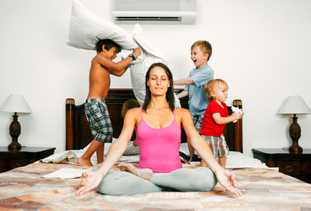The Importance of Self-Care for Parents

Sunny Im-Wang, Psy.D., S.S.P.
Parenting is a noble and challenging job—in fact, it’s probably the most difficult job there is. Unfortunately, one of the biggest mistakes that many parents make is not in their actual parenting, but in their tendency to neglect taking care of themselves. Mothers are especially guilty of this as they try to take care of everyone else. Good parents naturally put the needs of their children first, but too much self-sacrifice is actually detrimental to you and your children. Failing to take care of yourself affects your children far more than you may realize. If you neglect your health over the years, you won’t be there when they’re older. Or, they’ll end up caring for you while they’re also trying to raise their own children. Also, you may end up missing out on seeing their children—your grandchildren—grow up. Your grandchildren will miss out on having you in their lives as well. So, while it may seem selfless to neglect your own needs, it’s time to reconsider that notion. One of the most important areas to reconsider is the need for sleep, as it is one of the most neglected—and most important—areas of self-care for busy parents. Whether you have a newborn who wakes you up several times a night or active teens who cause you to lose sleep due to worry, there are ways to improve both the quantity and quality of your sleep. Following are several helpful tips to improve your sleep hygiene (i.e., your sleep habits) to ensure a better night’s rest: · Keep a consistent sleep schedule1. Far too many people vary the time they go to bed and get up in the morning. It’s best to keep the same sleep schedule each day as much as possible, even on the weekends. Doing this will condition your body and make it easier to fall asleep and wake up at the desired times. This will be more challenging with a newborn, so stick to a schedule as much as possible and remember that, within a few months, your baby will probably start sleeping through the night. · Create surroundings that are conducive to sleep. It’s difficult to sleep when you’re uncomfortable or have a room that’s too light or too warm. Considering the fact that you spend one-third of your life sleeping, make it a priority to invest in a good mattress, quality bedding, shades that keep out light, and anything else that will make your room comfortable, dark, and quiet. · Don’t use your bedroom for anything besides sleep. Your bedroom should not be your library, study, or entertainment (e.g., TV or stereo) room. If you have a television, computer, stereo, or things related to work in your bedroom, it’s time to put it (or them) in another room. This way, when you go to bed, you won’t be distracted or tempted to engage in activities that will keep you awake. And your brain (and body) will associate the bed with sleep. · Take naps during the day. If you have a newborn and can’t sleep through the night—then a nap can provide much-needed rest! Take a nap when your baby is napping. · Create a relaxing bedtime ritual1. It’s difficult to abruptly shut off your brain so you can sleep. Spend the 30 minutes prior to bedtime winding down, both mentally and physically. For example, listen to soft music, meditate, read something relaxing (outside of the bedroom), or take a soothing bath. This lets your brain know that sleep will soon follow. On the same note, avoid things like watching the news, spending time on the computer, or having a heated discussion prior to going to bed. These will make it very difficult for you to fall asleep. · Avoid alcohol, nicotine, caffeine, and spicy or heavy foods for at least 4 hours before going to bed. These substances can interfere with a good night’s sleep. · Don’t let your baby or children sleep with you. Letting them in your bed for a short while for comfort and soothing is okay, but then they need to go back to their own bed to sleep. · Share nighttime care and feeding of your baby with your partner.Take turns so both of you get as much sleep as possible. If breast feeding, let your partner attend to your baby’s other needs during the night. Remember, if you take care of yourself so that you feel good and are well rested, you’ll be less irritable, happier, and more alert for your children—in other words, you’ll be a better parent. Your children will significantly benefit, both now and for years to come! For permission to reprint this article, click here. © 2010 Sunny Im-Wang, Psy.D. All rights reserved. ______________________ Reference: 1 Epstein & Mardon, 2006. How to Get a Good Night’s Sleep: A Six-Step Plan. The Harvard Medical School Guide to a Good Night's Sleep. Ch 6. |
Here are more articles you might want to readAir Travel with Young Children: Airport, Airplane, and the Air Pressure?

Tips for Managing Parenting Anxiety
Understanding Your Child’s Sleep
Storytelling and Bookmaking Activities

Executive Function: Problem Solving Skills and Other Complex Thinking Skills in Children

Picture Journaling for Young Children

|
Copyright © 2011-2024: Sunny Im-Wang, Psy.D., S.S.P. All Rights Reserved.
DISCLAIMER: The information on this site is for general information only. This information should not be construed to be either formal psychological or medical advice or the formation of a professional relationship with the authors of any of this information.
Persons accessing this site are encouraged to seek independent professional advice regarding their individual issues.
DISCLAIMER: The information on this site is for general information only. This information should not be construed to be either formal psychological or medical advice or the formation of a professional relationship with the authors of any of this information.
Persons accessing this site are encouraged to seek independent professional advice regarding their individual issues.